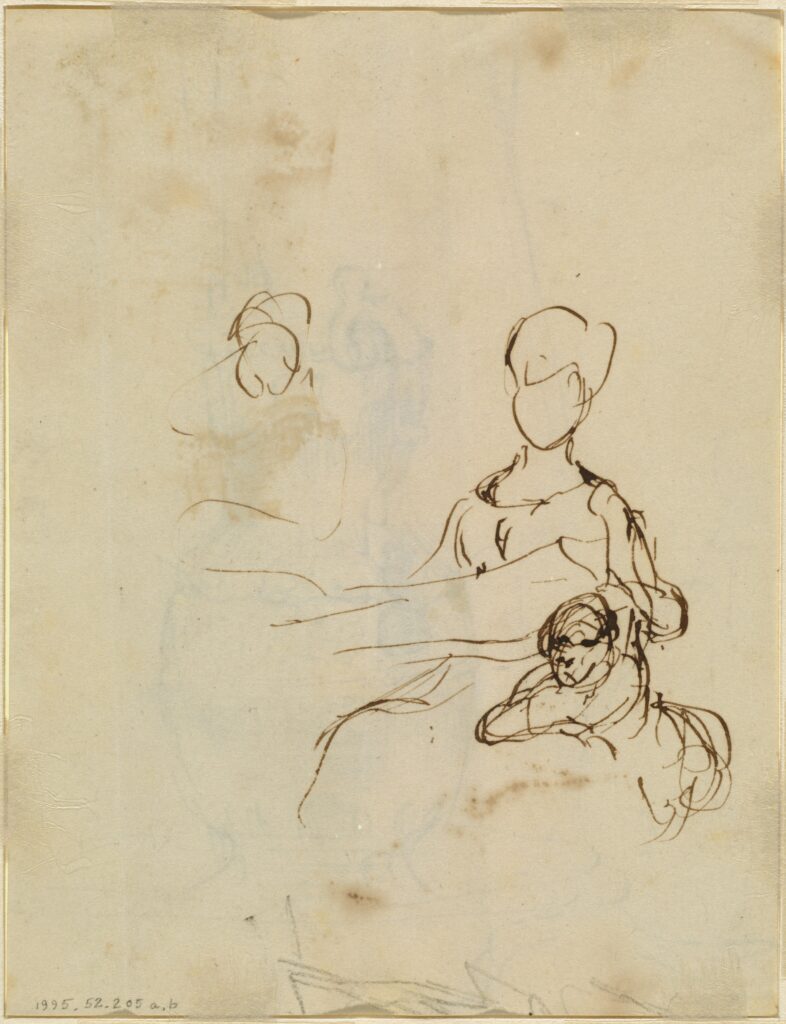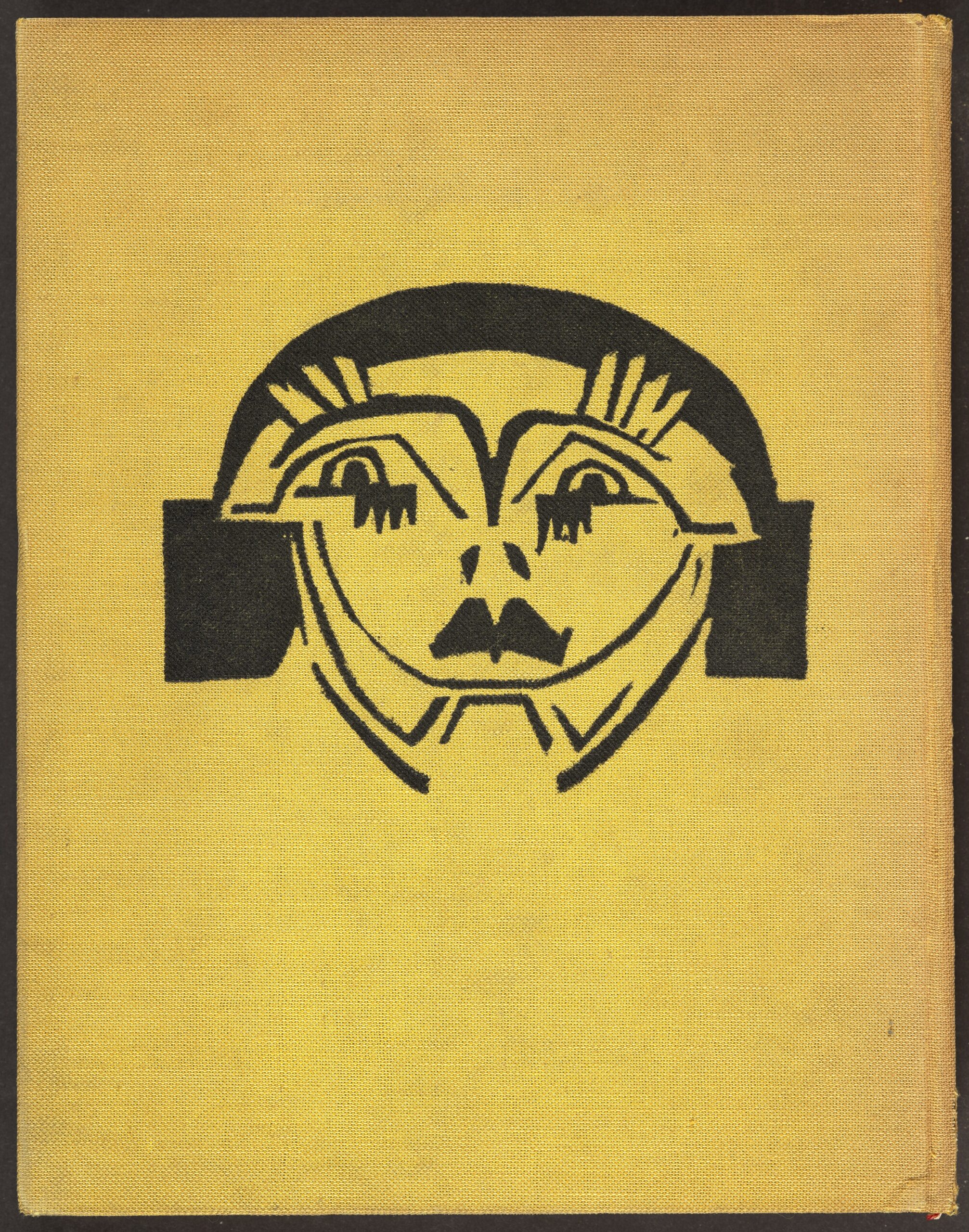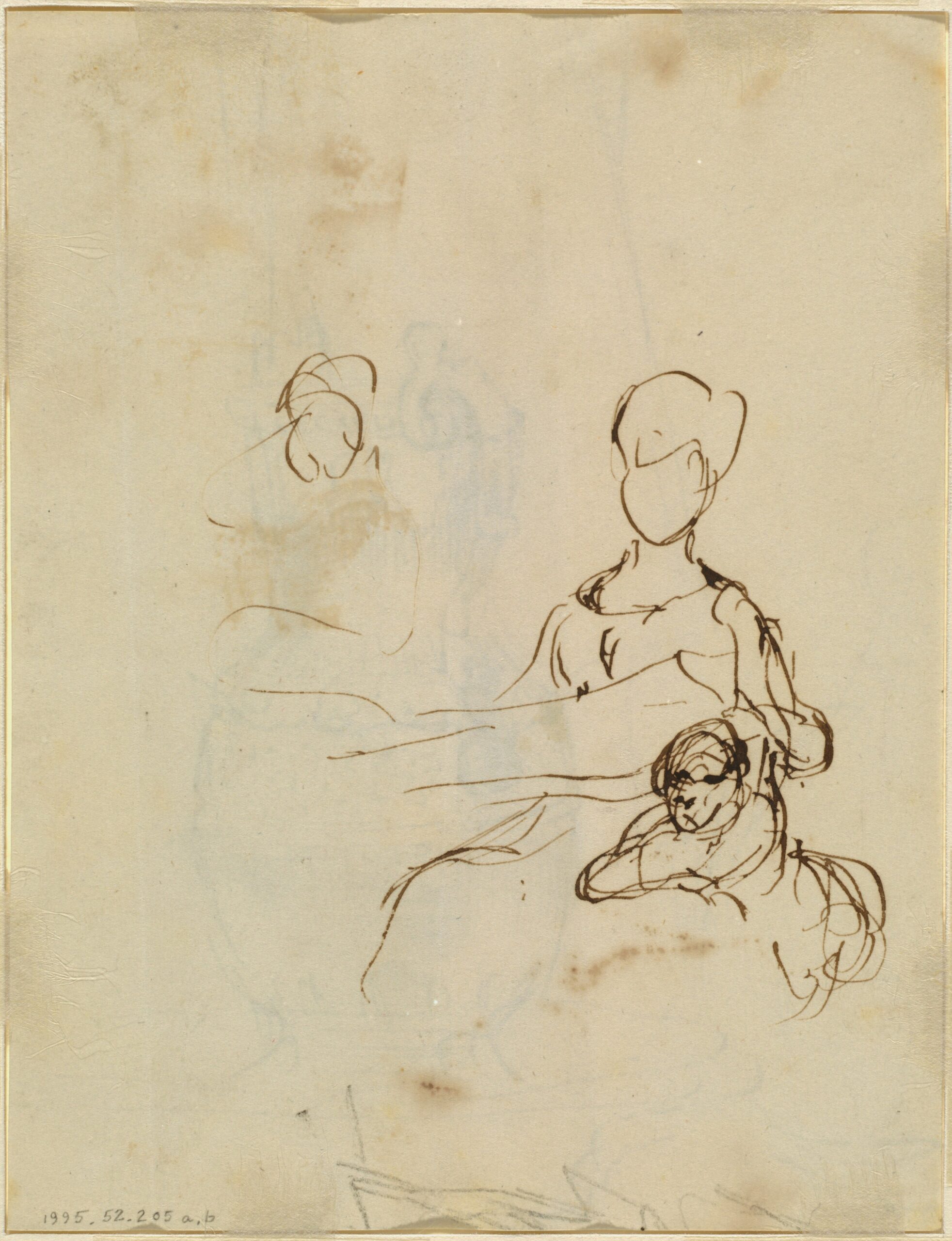Nanny
Sumita Mukherji
(cw: self-harm)
Two months after she had given birth, after her husband had returned to work, after her womb had healed enough, Kavitha plodded to her second meeting with the mothers’ group. Summertime fermented in suburban Boston, fragrant with lilies and sweat. A year ago Kavitha sipped Prosecco with dinner, the delightful bubbles swirling, sliding, popping, meandering down her throat. No more. She wore a teal cardigan and maxi dress and ashen ballet flats. Running late now, Kavitha trot-walked, trot-walked down the bike path, past a split elm branch, a youth soccer game, a dozing female mallard, trying to arrive early in case the group engaged in premeeting chitchat. While Kavitha hurried, her husband’s aunt watched the baby. Bless her tolerance. Under her arm, Kavitha embraced a package of assorted pacifiers for another mother more homebound than she.
A woman strode next to her. Petite, ramrod straight, sunburned. A jagged slash of vermillion lipstick edged beyond her mouth. She had piled her dirty blonde hair into a high bun. The woman’s glances zig-zagged to the trees, the strollers, the tandem cyclists. She seemed somehow nervous and wily, quiet and bold. When the woman stared at Kavitha she became unaware of a stray twig on her path or the gnats skimming her hair. The woman’s furtive eyes possessed concern but no warmth.
“I’m Emily,” she said, squeezing Kavitha’s shoulder. “And you are?”
Kavitha shrugged Emily’s bracing hand away. She should have been troubled by the touch, batted it from her shoulder, yelled, told her off, but today Kavitha’s sluggishness had bathed her in a strange detachment that she couldn’t shake. Yet for some reason she mumbled her name noncommittedly. Emily nodded in approval and mouthed Kavitha’s name. Kavitha focused on the cyclists ahead of her. She shifted the bag of pacifiers into the crook of her elbow. After the mothers’ group, she would have to barrel home and feed her colicky infant son. And reschedule, for the third time, her appointment with her postpartum therapist. She turned off the bike path.
“You’re heavy with milk,” Emily said. “You’re about to burst.”
“My son is two months old,” Kavitha said, not knowing why she spoke to Emily. “I’m a new mother.”
“I thought so.”
“But I’m other things, too,” she said, her voice sharper. Yet what those things were, Kavitha—numbed and exhausted—couldn’t name.
“You’re a new mother. And you’re wearing long sleeves on an unbearably hot day. I notice people wearing long sleeves, because I wear them, too. And I’ve been noticing you.” Kavitha hurried on. Emily also wore a cardigan, a faded mauve torn at the sleeves, bell bottom jeans, and heeled beige sandals with plastic daisies at the toes. On her left shoe the flowers drooped. Kavitha imagined snipping the falling petals. Her pointer and middle finger made a vee and she reached downward and sliced the air. Annoyingly, the daisies still danced at the periphery of her vision. They taunted her.
At last the café parking lot came into view. The mothers’ group was probably sipping iced teas and laughing as their babies slept in their strollers and car seats. At her first meeting, Kavitha had brought her son, who dozed under a bamboo blanket in his stroller, his pursed, strawberry-red lips at peace. Across the café, the group sat at a butcher block table and bent their white necks like swans as they cooed at their young. They seemed unapproachable, like a flock on a distant lake. Then a sinewy brunette waved her over. Kavitha introduced herself and her son awakened and shrieked. Soon the members yelled to hear each other and nearby customers fled. Kavitha traced her finger around her baby’s lips, but that only worsened his howling, so they left mortifyingly early. She vowed to turn up at future meetings alone.
Outside, Emily’s arm brushed hers. The hairs on Kavitha’s arm shot up. But in her numbness, she didn’t understand that her gooseflesh meant fear. Emily pinched the sleeve of Kavitha’s cardigan. “You’re a cutter, aren’t you? What did you use? A knife? Scissors? I used a mechanical pencil once.”
“I don’t cut myself anymore.” Not since her miscarriages, before the baby was born, though she still dreamed often of cutting herself with a boning knife.
“I don’t either. Hardly ever. Come here. Come closer.” Emily rolled up Kavitha’s sleeve. No, no, no, Kavitha thought, seconds too late. “Your scars are so faint. You don’t need a sweater.” Emily’s eyelid ticced. After a nervous breath, Kavitha pulled her sleeve down to her wrist.
Tat-a-tat-tat—from somewhere tapped a toy drum. Kavitha searched the parking lot, the sidewalk, the bike path, but failed to locate the sound. Her inner elbow dampened. The day’s humidity clamped her temples like a vise.
“They’re like shooting stars,” Emily said. “You have a whole galaxy of them. They’re
amazing.”
“I hate them. Soon they’ll disappear,” Kavitha said, stepping back.
“You’ll always have them. They’ll haunt your dreams. But you’ll cherish them. Look, there’s the café. Can I come in, too?”
“How did you know I was going there?”
“Anything’s easy enough to find out if you watch. Observe.”
Kavitha peered into the café and hoped to catch the eye of someone in the mothers’ group. But the tinted windows clouded her view and the people inside looked like alien creatures wading through a sea.
“What do you think about getting tea after your meeting?” Emily asked. “Somewhere else. You need something more refined, that’s your style. Not this dump. I can wait for you outside.” She craned toward Kavitha, a speck of lipstick staining her nose.
“No,” Kavitha said. “Look, I have to go.”
“You have to go? You don’t. You can skip your meeting. Your baby’s not on you.” Emily bit her lip and smeared her teeth.
“I really have to go,” Kavitha said, moving one step toward the café door. “I don’t want to keep you.” Emily shimmered in the humidity, a mirage. Her mouth made a moue of amusement and scorn.
“You don’t want to keep me,” Emily said. “Nobody keeps me. But I keep people. You’re a new mom and you obviously have no idea what you’re doing.”
“Obviously,” Kavitha said. She laughed a milky note that turned sour. Then she cursed herself for prolonging the conversation.
“You’ll learn from me,” Emily said. “I’m a baby whisperer, the best nanny there is. You’ll be an expert in no time. You’ll learn how to sleep. How to fly.”
“I don’t think so.” Kavitha dashed to the café and sped to a seat. Emily held back.
At the table, a woman named Samantha or Sally or Lucy asked, “Where’s your baby?”
“Home. Thankfully,” Kavitha said, handing her the pacifiers.
Emily lingered outdoors and paced. Though Emily couldn’t see her, Kavitha shooed at her as if she were a pigeon.
“What are you shooing at?” the same woman asked.
Kavitha let her hand drop and turned away from Emily. “Nothing,” she said. She brought to mind an image of her son asleep, finally tranquil in his bassinet, and the sweet, fat orbs of his fists bursting through his swaddle.
The meeting began. Emily waited outside, in the line of Kavitha’s sight, until she got bored or the heat tired her or she decided to move on to someone else.
*
The following week, Emily sat, her wedge-sandaled foot tilting against the side of a bistro table and her leather-jacketed body facing the café entrance. Kavitha held her breath as Emily waved her over. The scent of banana nut muffins assaulted her. That amplified sense of smell from her pregnant days persisted: it turned old cravings rotten and neutral scents bright. On Emily’s table laid a self-help book: How Not to Fall Over.
“You look like you’re still in dreamland,” Emily said. “But you came for your meeting anyway. You showed up early because I can help you. You’re not wearing any makeup today. Baby kept you up all night? It’s all right, you still look good. Exhausted, but good. I don’t care about myself anymore, but you still do, your bun is so neat and tight. I like it when people care. Here, I saved you a seat,” Emily said, patting the metal chair next to her. “I got something for you,” she continued, nodding at the book.
“I don’t need it.” Kavitha had read the book and knew it was about cutting—how not to, how to heal. A useless book telling cutters to breathe. She sat on the edge of her chair. The uneven legs wobbled.
“But you do. That’s why you came here. You knew I’d be waiting for you. We could sit under a tree and I could read this to you. You can close your eyes and listen to my voice. You’ll finally know what it means to get relief. And relax.” Emily gazed at Kavitha, assessing her for something Kavitha couldn’t name.
The mothers’ group gathered. Kavitha rushed to them. So did Emily. “Hi,” Emily said. “I’m her helper.” “No,” Kavitha said, but the group, hunting for their phones, didn’t notice. The mothers discussed burping, vomiting, swaddling, rocking, bouncing, sleeping, whimpering. Near the end of the hour, Kavitha, wanting and not wanting to return to her baby’s colicky screeching, clambered from the table. As a good-bye, she wiggled her fingers at the other mothers, but the group talked on, and she didn’t want to disturb them. “See you soon,” Kavitha murmured to a member.
“You’ll see me right now,” Emily said, already at Kavitha’s side. Kavitha shuddered. “I keep up with people. All those years chasing toddlers. And you won’t be seeing any of those mothers soon, not outside the group, right? They don’t call, they don’t text. But you’re hoping they will. That’s right, I know your secrets. And I know you think I’m crazy. Let’s go to tea. Don’t you want that refinement? It’s hard to be refined when a baby throws up all over you. Believe me, I know. I think it’s your mother-in-law watching the baby. She’s older, isn’t she? White. Your partner must be white. Unless they were adopted.”
“You don’t know me,” Kavitha said, stepping sideways out the door. In the distance, cars drummed over manholes. Or was the drumming in her head?
“It’s easy to know what’s going on with you. You keep your living room blinds raised so that anyone can see.” On the sidewalk Emily shuffled her foot to some private groove. “You’re at the end of the block, right near the corner. You don’t come to the window often. I’m guessing you lie down on your couch, try to sleep when the baby does. You take him for a walk in the morning, 9 a.m., when it’s somewhat cool. Sometimes you stop at the bakery to buy a cookie. Shortbreads are your favorite. On your way home you talk to your neighbor when she’s weeding. You try not to drop dead.”
Kavitha parted her mouth and a line of drool spilled. She tried to wipe it away as it fell and missed. “How long have you known about me?”
“Oh, forever.”
“What does that mean?”
“Look at me,” Emily said, halting her foot. “I believe we’re souls meant to connect. A fortune teller told me that an intriguing woman would come into my life, and that woman is you. The way you move is mysterious, like you’re always retreating. So what about that tea? You can hear about my misadventures with past families. But I can take the craziest baby and make them as calm as a pond on a day with no wind. I told you I’m the baby whisperer. At tea we can talk about why we cut ourselves. Always in secret, yes? Carving into my skin was like carving the initials of my boyfriend into the bark of a tree. I loved it. And you can tell me about your baby and I’ll tell you how to soothe him.”
The blue of the sky against the hot air angered Kavitha for its false hue of coolness. Everything, the world, was wrong.
“I want you to walk away from me,” Kavitha told Emily. “Turn around so that your back is facing me and keep walking. Or I’ll go over to that policewoman directing traffic.”
“Hey, there’s no need to do that. No need,” Emily said, stroking back a tendril again and again. “I’ll see you next week.”
Kavitha trudged toward the bike path. Emily didn’t follow. The muted drum of Kavitha’s feet along the asphalt calmed her. Soon the beats of her footsteps magnified to the beat of a timpani and then a snare drum. An image came to her of a street musician drumming the bottom of a bucket. The rhythms, the optimism, the beats of hope, of tulips in spring. Kavitha could sense the optimism in Emily—crazed but there—even as she wanted to peel away from it. She wore a navy track suit, and against her doctor’s advice, Kavitha ran. Before she was a mother, she played the piano. The high notes of Chopin. Supposedly he moved from lover to lover. To George Sand, who tended to him. To drown out the drums, Kavitha jogged to a nocturne: slow, fast, slow. Pain pierced her abdomen and she stopped. The steady rhythm of lovers for Chopin, a steady rhythm of life. But like a slashed drum, Kavitha, limping, had no more rhythm. She was a toddler botching a skip. A timpani missing its sisters. A woodpecker’s slivered beak.
*
As Kavitha approached the café for another meeting, her belly fluttered with fear. Or excitement. At first she didn’t recognize Emily, whose hair spread out like jellyfish tentacles along her back. Swaying to the café’s trance music, Emily slid a cup of black tea to the empty seat next to her.
At another table, a wraithlike woman tipped hot coffee onto her thigh and shrieked like Kavitha’s son. On cue Kavitha’s breasts leaked. She wanted to go to the woman, to soothe her with ice against her denimed thigh, but feared that the woman, pitiably grunting like a boar, would only push her away. As Kavitha sat, Emily inclined toward the woman, and she could see the smoothness of Emily’s neck, her new precision with her ruby lipstick, the hummingbird pendant that touched the top of her rose sweater dress. Today, Emily seemed softer.
Softness left Kavitha’s body with the birth of her son. Detesting her ropy body, Kavitha twisted her emerald engagement ring around and around her finger.
“Hey, hey,” Emily said. “Stop that.” She batted Kavitha’s hand away from her ring.
“Why?” Kavitha asked. Emily’s touch felt less foreign.
“You don’t need that. Look at how tarnished it is—it’s disgusting. It’s not your pacifier. Give it to me.”
“My ring?” If Kavitha squinted it still shined.
“I said give it to me.” Emily moved to grab her hand, but Kavitha slipped the ring off before Emily could do so. The ring, before the baby. Before the ember of her son’s lips against her neck, before his stallion legs kicked her hands, arms, stomach. The ring of untroubled times—Kavitha despised it. She let it fall onto Emily’s waiting palm.
“Thank you.” Emily brought it up to her eyes. “An emerald. Why not a diamond? Your husband didn’t want to? Doesn’t matter now. It’s mine. I can soothe you better than that ring, just like I’ll soothe your baby. You can even sleep through the night—I’ll feed your son.” Emily buried the ring in her purse. “This ring is cheap. You deserve better. I can get you a huge diamond.”
Kavitha recognized Emily’s clothes from the town’s consignment shop. “You don’t have money.”
“I have a stash.” Emily let out a stuttering laugh. “I have it in my sock drawer, I have it in the freezer. It’s just waiting for me to spend it.”
She poked Kavitha’s knee, and Kavitha tingled from Emily’s touch—somehow, it satisfied. “I finally got a good night of sleep, and look at me, I’m any successful woman,” Emily said, looking Kavitha up and down. “God, will you always be this exhausted?” She pulled a vodka nip from her purse and opened it. The odor burned. Kavitha hunched and looked around, but no one spotted the bottle. Emily dipped her head at the alcohol and at Kavitha.
Kavitha’s knuckles grazed her chest and she waved her hand no. There went half the bottle, right into Emily’s mouth, her throat undulating with glee. What if Kavitha snatched the bottle and dropped it? All those tiny shards of glass. She would cut her hands cleaning it up, the wounds throbbing with a delicious burn. No, not delicious. She had promised her therapist she would stop daydreaming about cutting, promised herself to end it so she could become a better example for her son. But she couldn’t help it, and “not delicious” was a lie. The mothers’ group approached with the clicking of their heels and flats. Kavitha filled her head with their cadence and rose to greet them.
*
For two weeks Kavitha avoided the mothers’ group. She told her husband’s aunt to stay home and strolled the baby in a direction opposite from the usual, toward the water tower and the highway, away from the center of town. When the baby finally slept she microdreamed of her mothers’ group meetings, where Emily danced at the fringe.
At one past meeting the group prattled the old advice about holding your baby for hours to soothe colic. And so at two a.m., Kavitha once again paced at the foot of her empty bed and her son’s empty bassinet—to her envy, her husband now slept in the office—and clasped her inconsolable infant against her breast. Don’t let him go—the same voice a mother panda hears when she births a cub who cannot crawl, hear, or see, and who must be carried by hand or mouth for months. Kavitha’s arms ached. Cramped. Couldn’t she at least hold her son by her mouth, too? If it would stop his tears Kavitha would do more than carry him with her teeth: she would swallow him whole. Maybe she needed Emily’s counsel.
A few hours before the next meeting, Emily and Kavitha whispered at a library café. Emily wore an eggshell-white cardigan with torn sleeves and a floral A-line dress. Aged farmers’ almanacs lined the shelves around them.
“I had a feeling you’d come back,” Emily said, sliding closer.
“How could I stay away?” Kavitha stroked a nickel and dropped it. The sound of the coin dropping amidst a crowd of conversations—a lonesome beat, but as muted as Emily’s voice was now—Kavitha craned to hear it.
Tilting, Emily plucked the nickel from the granite floor and flipped it. “Heads we go to your backyard and slice ourselves under your apple tree. Tails we stay here and get manic on their chocolate coffee beans.”
“Are you serious?” Kavitha asked. “I like my skin intact and whole, thanks.” Emily’s word “slice” had shivered Kavitha with desire. Yet she pinched her lips and inched her chair backward. It whined like a hyena, and everyone looked.
“Wait—I didn’t really mean it. Hey, don’t tremble like that. I know you don’t want to give the baby bad feelings. We’ll stay away from your house. But I’m the best nanny. He’ll be dazzled by me. We can go somewhere else. Just watch the squirrels. No talk of cutting. Anyway, I need to stay away from the little girl I look after for a bit, the family’s mad at me for some reason.”
“You’re not coming near my baby.” Kavitha sipped some chai, grateful that the aroma pacified her stomach. “So, you’re a nanny. Are you certified?”
Shoes—loafers?—Kavitha didn’t recognize closed in. A twiggy, middle-aged, loud-spoken man asked her, “Are you having fun talking to your friend? You must have the tiniest Bluetooth headset. How’s the sound on that thing?”
“Good,” Kavitha said, ducking her head and fiddling with her bare ear, thankful that her frizzy hair hid her fingers. The man stayed, as if he expected to see an earpiece. Staring at his scratched loafers, Kavitha became astonished at the depth of hedonism in her that allowed Emily to elevate her into a universe far superior to the one this repulsive man lived in, this man who dared interrupt and whom she wanted to incinerate. Finally the man left, and she told Emily to go on.
“You don’t need to be certified.” Emily spun the nickel on the tabletop. “So many families look for a deal, under-the-table stuff.”
“But don’t you? And what about the coke you did with your last family? Why does this family trust you?”
“When did I tell you about the coke?”
“Before the last group. Coke, heroin, speed. Or was that just a story?”
Emily scratched her nose. Today her fingernails were beautifully manicured, with images of stars and scythes. Kavitha wanted to ask Emily to scratch her scalp. Just once, from the top of her forehead to the nape of her neck.
“Some things about me are true. Some are false.” Emily shoved the coin off the table. “I’ll patch it up with the family. You’ll see.”
“You’re an addict, aren’t you? Addicted to pain—”
“Like you.”
“Addicted to highs,” Kavitha continued. “And you’re not telling me the whole truth. Maybe you go insane when you’re high. Are you insane? Wait, don’t answer that.” Her hands quivered and she sat on them.
“You really think I’m that crazy?” Emily blinked and blinked, but no tears came. She chipped away at a nail. The scythe became a blade. “I have all of these tales,” she said, “but I’ve been sober. Honest. Have you been telling your husband about me? He’s been putting ideas in your head. I should nick his jaw so he gets a little taste of what it feels like. Don’t you want him to have a little more empathy for you? You’ll gain more empathy for him. The suffering of others makes us kinder. By the way, has he noticed your missing ring?”
He hadn’t. Like Kavitha, he was a zombie. “Why should you care?” she asked.
“Why should I care?” Emily jiggled her leg. “Why shouldn’t I care? I’ve kept it by the way. Haven’t sold it. Yet. Does your husband take care of you? I bet he doesn’t. That ass. I’ll punch him in the face.”
“No, you won’t.” Kavitha laced her fingers and parted them. What if Emily’s nail pierced her leg? Would Kavitha become wild and rent her own skin? Tabla drums suffused her, the thrilling rhythms familiar from childhood religious celebrations. The beats infused Kavitha with ecstasy, fear, loathing. She became an animal: Kavitha a deer and Emily a wolf. She didn’t mind being a deer. A lone deer searching for no one. Anyone.
“Hey. Scoot your chair over. Don’t be shy,” Emily said, beckoning with her finger. “God, you’re like a toddler with stranger danger. Let me show you something.”
Kavitha moved her chair beside Emily’s. Spirited hands struck the tabla. The cacophony of life: wending through crowds with her husband prebaby in Manhattan, lulling her heart with breathwork when her baby wailed, clenching her sheets at dawn to stop her fatigued dizziness. “Look up there. Yeah. Don’t look down. Don’t cheat,” Emily said.
A mural of angels lined the ceiling. Kavitha wanted to reach upward, but pressure, no stronger than the tip of a pen, landed on her wrist.
“Take a deep breath in,” Emily said. “Now exhale.”
Something skittered the length of her arm. Kavitha looked. Emily’s nail, stars and all, paused at a vein, tapered and glistening and pink.
“Doesn’t it feel divine?” Emily asked. “You’ve missed cutting, haven’t you? You’re getting scared again—see the way your hand is shaking? Look at me. You need to feel good. It’s okay to let go once in a while. Watch me.” Emily ran her fingernail down her own scarred wrist. A bit of her skin peeled.
“Scoot closer to me,” Emily said. “So close that our arms touch. Doesn’t that feel nice? Hey, don’t tremble. We could live together, you and I. And your husband, I suppose. I can rock your baby and you can have so much freedom. When you’re ill, I’ll take care of the baby. And I’ll take care of you. I’ll slap your husband away so that I can put a cool damp cloth on your face. You don’t believe that I would take care of you. But I would. Ask any of my former families, especially when they’re drunk. You’re tired. You can rest your head on my shoulder. Isn’t that cozy? Now look up at all the angels. They’re giving us their blessings.”
*
The eve before Halloween: Kavitha and Emily wandered along a street of mansions. They stopped at one that paraded a dozen spider webs and miscarved pumpkins. Slivers of ice lined the empty driveway. The enormity of the house made Kavitha’s own feel like a shed.
Before she left home that evening, her husband had been bobbing on a yoga ball, their son on his lap, his wispy blond hair tickling the baby’s forehead. The baby laughed and whimpered, laughed and whimpered. When the cheerful dimples on their son’s puffed cheeks surfaced, her well-rested husband looked infuriatingly like an ideal dad in an ad.
“Have a good time out,” her husband said. Kavitha wanted to. She edged the front door open. Outdoors, Emily waited, her crossed forearms gleaming like fresh bones beneath the fluorescent street light, and told her to speed it up. “I’m coming,” Kavitha said.
“Honeypie,” her husband said, keeping his eyes on their son. “You’re talking to yourself again.”
“Shh, shh,” Kavitha replied, ignoring his mockery and swatting the air behind her as she closed the door.
Now in front of the mansion she gripped the wrought-iron fence so that in her weariness she wouldn’t fall. Emily pointed toward the second floor. “This is it, this is the house. Up there’s the little girl’s bedroom,” she said. The absence of light in the house made it somber. “Down the hall is the parents’ room. Let’s go in.”
Kavitha marched behind Emily up the stone steps. Cracks slithered up the masonry and ivy snaked around the columns of the house like a warning. They stepped inside. A marble foyer. A bar the size of a small pub. Heated taupe floors. A skylight framing the moon.
Emily gazed at the moon, nearly full, its face impish. “Did you know it’s our friendversary?” she said, heading for the spiral stairs. “Six weeks.”
“That long,” Kavitha said, tucking a tag behind Emily’s violet turtleneck.
They reached the master bedroom. Parted curtains revealed floor-to-ceiling windows. Drop lights and a three-candle chandelier illuminated the queen bed and makeup vanity. Mysteries topped hickory side tables. No rocking chair draped with a baby blanket here.
The night before, Kavitha had laid her son in his bassinet, but he only moaned and stirred. She turned off the bedroom light and waited for him to hush so that she could allow herself some sleep, her motionlessness a reverse Mother May I, a game she had loved as a child. For an hour the baby groaned and for an hour she remained frozen. It was her fault her son wouldn’t calm: He sensed that she was only an average mother and that at times she did not even rise to the level of mediocrity. Yet even after he fell asleep Kavitha stood still in the darkness, her muscles quaking from the effort. Her son huffed in his sleep and she didn’t know why. The universe was built upon sounds that could splinter you as you waited for their meaning.
“You should look at something.” Emily sat at the vanity and slipped a jewelry case onto her lap. Inside the box, gold necklaces studded with diamonds glimmered. So did a diamond bracelet, its jewels twice the thickness of Kavitha’s pinkie.
“Put a necklace on,” Emily said. “Go on. This is the type of jewelry you deserve. Yeah, just like that. Look at the way it highlights your neck.” She tossed Kavitha a pair of matching earrings. “These might be a little big for your ears. Here, let me put them on you. Good. You look classy. Elegant.”
And then there was the queen bed tempting her with its golden sheets. Kavitha knew they would be the silkiest sheets she ever felt, knew that if she touched them she would surrender to sleep.
“Lie down,” Emily said, walking to the bed. “You know you want to.”
“We don’t have pajamas.” Kavitha tittered and yanked the heavy earrings from her ears.
“You’re nervous,” Emily said. “It’s okay, this is our little haven. Mama and Dada and the little girl are at a haunted house. Are your clothes too tight? You can take them off. You don’t need to worry—I’ll keep my distance, I promise. I’ll just stroke your hair. Caress your cheek until you’re asleep. You’re shivering again. It’s okay, we’re adults. Okay, okay, you can keep your clothes on, I was just trying to help you relax. But look at your shirt—it’s so small it’s choking you. You kept it to remind yourself of your body before the baby, didn’t you? Here, I’ll sit against the headboard and you lie your head in my arms. I won’t hurt you. I want to comfort you. Hold my hand and step up.”
Kavitha sank into Emily’s arms, sank into a midnight desert, and the pulsing djembe in her head faded, all sounds faded into blissful stillness. But the baby—she mustn’t sleep.
At the top of the room, in a half-moon window, winking stars watched over Kavitha and Emily. As a child, Kavitha once spent the night in her backyard with her best friend, and now she craved those endless stars and lemon syrup soaking shaved ice.
Emily’s hand brushed Kavitha’s forehead. The bedroom had a drywall ceiling just like hers. Kavitha shifted her head to the center of Emily’s lap and closed her eyes. Warm fingers stroked her scalp and she slackened. Was this perfect unknotting the release her son felt at the border of sleep?
“You can nurse if you want to,” Emily said.
Kavitha bolted off the bed. She wrestled her feet into her ankle boots. “I need to go.”
“Don’t be like that.” Emily spread her arms, as if for a hug. “We just got here.”
“Get me out of here,” Kavitha said, struggling with a boot’s zip.
“All right then, we’ll leave.” Emily swung her legs over the edge of the bed. She sat, velvety palms resting on her knees. “I really scared you, didn’t I? You know I didn’t mean to.”
Across the ceiling crawled a monstrous Daddy long legs. Kavitha clamped her mouth so that it wouldn’t drop in and spin a web from roof to tongue.
“One last thing. Come sit on my lap,” Emily said, patting her thighs. “You’re hesitating. But your instinct is saying ‘yes.’ Come here. You’ll like it. I swear I won’t scare you.”
Kavitha crept closer and turned so that her back faced Emily. She crouched. Outside mockingbirds flapped their wings into the air, into Kavitha’s belly, and her body vibrated their nervousness. The fragrance of lavender permeated the room, a fragrance of dizziness and enchantment. As she sat, tambourines banged, melodious and discordant and fraught. Emily dug a nail into Kavitha’s wrist. Kavitha gasped and leaned into it.
*
At the mothers’ group the next week and the week after—no Emily. Kavitha loosened in her absence. She told her therapist that once she would have missed her, but now it would be fine if Emily disappeared forever. A white lie, but she told herself that she missed Emily only in the way you missed a sweater on a chilly day. At group, Kavitha said things that she had never said in Emily’s presence: how she daydreamed of running an errand and never returning. How she imagined tumbling down the stairs and injuring herself just enough to be hospitalized for a week. What she didn’t say: how every morning still she fought the urge to cut her flesh. After one group session she bought her son a play drum with an owl-lined shell. Thanksgiving approached. The air was appealingly redolent with nutmeg and thyme. At home Kavitha baked a pumpkin pie so that her baby would smell it and, if a miracle occurred, calm. One afternoon, the baby whimpered, his initial sign of hunger. But before Kavitha could hold him: her doorbell rang and she answered it.
It was Emily, her hair a clump of hay, her temples sooty with mascara. “You’ve got to let me in. Please let me in,” she said, seesawing her heels up and down.
“You’re not supposed to be here. You know the rules. You don’t come inside the house ever,” Kavitha whisper-hissed. Back in the living room the baby’s electric bassinet rocked. Her son’s whimpers softened. Maybe he wasn’t hungry after all.
“Fuck the rules. I need your help,” Emily said. In her open tote bag she carried a box spilling strands of diamonds, rubies, pearls. Beneath that peeked segments of leggings and sneakers and underwear and a shawl. Kavitha moved to the center of the doorway so that she blocked the entrance. But Emily feathered past her.
“They think I did it, but I didn’t,” she said. Emily told her that the family she nannied for accused her of stealing. That they gifted her the box of jewelry—the parents were drunk at the time and didn’t remember. That they threatened to call the police. The hairs on the back of Kavitha’s neck rose. It was like being on top of a hill during a lightning storm—it was almost pleasurable. The baby cried out. In the silences between his cries came the breakneck nerve-wracking Latin drums from an anniversary dinner. Kavitha opened her mouth, hoping somehow to conceal her baby’s wails, but instead the drums thundered.
“I’m going to lose my job. My landlord will evict me,” Emily said, grabbing Kavitha’s arm. “You’ve got to hide me for a month. Just a month—a month is so long to a new mother, but really it’s nothing. And I can help you. With your baby.”
Kavitha wrested her arm from Emily’s grip. “No. The baby needs me. He needs his mother, not some stranger.”
“He’ll get to know me. I’m the baby whisperer, remember?”
The day wasn’t too frigid: Kavitha and her neighbors had inched their windows open. From next door Stravinsky’s “The Rite of Spring” wafted in, a piece Kavitha loved because her husband had played it for her after proposing in a garden. The rat-a-tat drums straining to be heard over the wind instruments. The notes infiltrated her skin. Inside her body they invaded and fractured her cells. Her body became a temblor of music, her body became edgy, her body became ethereal and light.
“Hide me before the police come.” Emily sucked in her sepia lips. “God, I need a release. And you look tense. You must have kitchen knives. Let me cut, just a little. So shallow it won’t even leave scars.”
“I’ve left that behind.” She had, she had. For more than a year the skin on Kavitha’s arms had been unbroken. “You’ve left that behind. It would be insane to fall down that rabbit hole again.”
“I need it. You need it. You know it. Listen to that baby crying.”
As the baby shrieked his voice rose an octave. “The Rite of Spring” played on repeat, but the baby’s cries obscured it. Kavitha’s breasts filled and she pressed her arms against her chest. Emily beelined for the kitchen. Through the back door window a sparrow pecked at the uncut lawn. Emily pulled a chef’s knife from Kavitha’s knife block and caressed its spine.
“We should share,” Emily said. “Just a little nick for you and me, something so small you’ll barely see it. And then we can stop. It’ll be the last and only time, and then we never have to do it again. What do you say?” Emily turned the knife back and forth in her hand. The kitchen light flashed against the blade on and off, on and off. “You know, I started when I was ten.”
“That young?” The drums from the “Rite of Spring” distracted her and Kavitha wasn’t sure that what she had said was in English. Or maybe English was the foreign language she had been speaking all this time and the drum-swarms were her native tongue.
“You’re trembling again,” Emily said. “You don’t need to worry.”
Emily’s hand shook like a leaf shivering in autumn. The baby’s cries stumbled and stopped. Before repeating, “The Rite of Spring” paused. Emily placed the blade’s edge against her skin and took a labored breath. Then she slashed. Along Emily’s arm a line of blood yawned open. That coppery, warm scent, like a new penny on a hot day, pervaded the kitchen. The scent, once seductive, doubled Kavitha over. She retched.
Mouth twisted, Emily folded in pain, the cut deeper than she had planned. Emily’s large cashmere sweater, creamy and ripped at the hem, cocooned her, and all Kavitha could see was her fragility. Emily bleated and Kavitha leapt to her with a speed that eclipsed thought. Her hands flew like a swift to Emily’s arm. Kavitha seized a piece of cheesecloth and looped it around the wound, stretching the cotton fabric until it stayed taut. That coppery scent reeked. But Kavitha managed. As she bandaged the cloth around Emily’s cut she hummed to soothe her friend’s panting. The humming worked—Emily softened her lips and dipped her head—and in Kavitha’s chest a warmth surged: she was ready for Emily’s devotion. But Emily still clenched the knife. Kavitha took it by its handle, making sure the blade faced away from Emily’s skin, but Emily clenched again and they both wrestled for it. Back and forth they wrenched, kicked, spat until Kavitha weakened and let go.
Emily danced backward and stopped. “Share with me,” she said, lifting the knife deferentially, as if for some god.
Kavitha stretched for the knife, but Emily held it beyond reach. Don’t cut me, Kavitha thought—not now, not yet. She asked Emily, “Why the rush? The baby—” But Emily seized her hand and jabbed.
The knife gashed Kavitha’s wrist. A vein severed. She dropped like a timbered oak.
As Kavitha fell, Emily raced out the back door. The familiar footsteps of her husband approached the porch. The baby screamed. Kavitha strained to listen to the language of her son’s cries, but the language was alien. A bass drum, a tabla drum, a tin drum flooded her. So did the rhythm of her mother’s heartbeat from when she lay curled in her belly. Her breath hitched. All of these sounds funneled into her ear and swept away everything else.
Afterward, Emily vanished. Kavitha tossed all of her kitchen knives except for one and asked her husband to hide it, to use it only to prep and chop. Years creep by. As best she can, Kavitha raises her sensitive son and ministers to her subdued marriage. Throughout her life, when she least needs it, the drumbeats linger, knock, pulse. At night the beats talk. At the edge of sleep they whisper that Kavitha is a sister who lost her twin.









